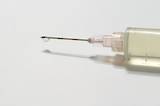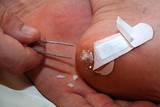Shop
01654
https://www.under5s.co.nz/shop/Hot+Topics+Articles/Health+%26+Wellbeing/Baby+wind+problems.html
Baby wind problems
|
It’s a fact, all babies get wind or produce gas! We take a look at where it comes from, why infant wind causes pain and discomfort and the treatment available for babies with wind problems.
|
You might also be interested in ...
Immunising kids in New Zealand
The topic of immunisation for kids often throws up lots of discussion and strong view points, but remember the choice to immunise your children is yours to make.
Removing splinters from kids skin
There’s many a theory on how to remove splinters, but this one using baking soda only takes a few minutes and doesn’t hurt your little ones!
join usJoin us on social media for all our latest news. |
sign upSign up and receive our latest newsletters. |
|







We take a look at where it comes from, why infant wind causes pain and discomfort and the treatment available for babies with wind problems.
Baby wind problems
All babies have wind, but some babies simply have more wind than others. Some babies also have an easier time passing wind, which may stem from a learned or innate ability.
While a certain amount of gassiness is completely normal, it may be causing your baby discomfort if you notice tell-tale symptoms such as; abdominal bloating, hard distended belly, frequent burping, spit-ups, hiccups, flatulence and excessive fussiness or restlessness.
Where does baby wind come from?
Gassiness in a newborn and many older babies often results from multiple factors, not just one simple thing.
There are different ways that air can get into babies’ digestive systems. Wind is produced in the digestive tract from the moment your baby has his or her first drink of breast milk or formula.
Newborn wind is a natural by-product of digesting lactose, proteins and other nutrients.
Diet
Some paediatricians and lactation specialists assert that traces of gas-producing foods, such as cruciferous vegetables and legumes (broccoli, cabbage, turnips etc), can be passed from mother to baby.
Other experts also warn against excessive acidity in the maternal diet. Citrus fruits and juices, strawberries and tomatoes are high in acidity and may irritate your baby.
Dairy products in a mother’s diet can lead to “intolerances” in their babies. The problem is usually linked to the milk protein found in milk, cheese, butter, yogurt, ice cream, etc.
Soy and peanut intolerance in babies often accompanies dairy intolerance.
When breastfeeding, a mother can test how these common culprits may be affecting her child by religiously eliminating all dairy, soy and peanut products from her own diet for two weeks.
Reintroduction of soy first, then a cooked milk product (such as hard cheese or yogurt) should be done very slowly to monitor your baby’s tolerances.
Air bubbles
Air bubbles can be taken in through your baby’s mouth and cause infant wind.
Most commonly, it is a result of the suction created during nursing. For this reason, it is important to burp every 3 to 5 minutes during feeds or between breasts.
If your baby is bottle-fed, make certain that the bottle’s nipple is the right size. If the nipple is too big, it will cause your baby to eat too fast. If it’s too small, it will cause your baby to gulp air.
Hyper-lactation syndrome
Another possible reason for infant gassiness is hyper-lactation syndrome.
When a mother has a very abundant milk supply, she may produce a larger amount of foremilk.
Foremilk is higher in water content, higher in lactose and usually delivered with greater force during letdown.
In excess, foremilk can make your baby’s stomach cramp, creating more fussiness.
A baby that gulps the quickly flowing milk also tends to take in more air, thereby getting gassier.
Because the baby may not be getting enough of the rich hind milk, he or she tends to want to eat more often, which perpetuates the problem.
The baby that suffers from hyper-lactation syndrome is characterized by higher than normal weight gain, increased gassiness, and fussiness.
Over stimulation
Over stimulation can also lead to increased wind.
Just as many adults experience intestinal disturbances in stressful situations, so are babies affected by their environments.
Sensitive infants that are bombarded with noise, lights, touch and multiple experiences will usually “shut down” in an attempt to reduce stimulation.
This shut down response does not completely insulate your baby from the effects of the stimulation.
Babies that are easily overloaded often experience more severe wind, fussiness and difficulty sleeping later in the day or night.
In general, the more activity (errands, visitors, TV, phones etc) in your baby’s day, the higher the chances of wind and fussiness in your baby’s evening and night.
Introduction of solid foods
The introduction of solid foods in older babies creates changes that may take your baby some time getting used to since different enzymes and probiotics must build up to digest and absorb nutrients.
Furthermore, foods that are commonly known to produce wind such as cruciferous vegetables, certain fruits and beans have the same effect in babies as they do in adults.
Crying
A certain amount of crying is normal in all infants, since it is their only means of verbal communication.
The are a number of reasons why babies cry such as when they are hungry, lonely, warm, cold, uncomfortable or in need of a nappy change.
Many babies go through periods of crying for no apparent reason, as they simply get used to the new world.
Crying in general causes babies to gulp air into their digestive systems. These air bubbles can get trapped in their stomach and/or passed on to the intestine.
Gas pain can also be a direct result of air swallowed during crying.
Why baby wind causes pain & discomfort
Normally, wind is not a problem and causes no pain or discomfort because it is quickly and easily pushed through the digestive system.
However, babies are born with a very immature gut. Most experts agree that for the first thirteen weeks of life outside the womb, the newborn digestive system is literally just learning to function.
Muscles that support digestion have not developed the proper rhythm (peristalsis) for moving food efficiently thought the digestive tract. Furthermore, newborns lack the probiotics that develop over time to aid digestion and complement the work performed by enzymes secreted in the digestive tract.
Wind has buoyancy and gas pockets can become trapped in the upper and lower intestines. The wind acts like a cork, impeding or halting the flow of gastric juices and built-up pressure causes painful bloating and swelling of the abdomen.
Your baby’s immature digestive system is unable to cope effectively. When gas pockets form in their stomach, this can cause the stomach to distend but is also the main cause of hiccups.
Treatments for baby wind
Burping your baby thoroughly will reduce the amount of air in their stomach, so that it does not pass on to the intestinal tract.
Unfortunately, burping is not 100% effective at eliminating wind, since it has absolutely no effect on the gas created in the intestines during normal digestion.
There are various physical therapies to relieve wind such as baby massage which may prove somewhat effective in helping your baby to release gas. Simply applying light pressure on the tummy can soothe and help.
You can also try carrying your baby face down on your forearm with your baby’s legs straddling your elbow and your baby’s chin resting in your hand. The gentle pressure placed on their little tummy can help soothe and release your baby’s gas.
If this does not work, there are several treatments available for infant wind. As always, you should consult your paediatrician first before giving your baby any medications, remedies or supplements.
Simethicone is sold under several brand names and is essentially a foaming agent that joins gas bubbles in the stomach on the theory that wind can be more easily burped away. However it has no effect on intestinal gas which can cause the most intense pain.
If wind has been created by something other than by feeding, simethicone will have no effect after the gassiness appears and will only work on gas near the top of the stomach.
Sodium Bicarbonate (baking soda) is used in several gripe water brands that are sold as dietary supplements. However sodium bicarbonate is an alkali which counteracts the PH of stomach acid which is naturally created in your baby’s stomach. It can temporarily relieve some discomfort caused by acid reflux.
Unfortunately, sodium bicarbonate is absorbed into the bloodstream and can have unwanted side effects. For this reason, sodium bicarbonate is not to be consumed by children under five years old. According to some doctors, sodium bicarbonate can cause an imbalance in babies’ electrolytes which can lead to serious problems.
Essential oils and herbal extracts (dill, fennel, etc) are used by some gripe water brands and sold as dietary supplements. There are known safety issues with essential oils. Many experts believe they are not to be taken internally by adults, let alone infants.
Please be well advised of all possible side effects before giving essential oils to your baby, no matter how small the concentrations.
Homeopathic formulas can be an excellent choice for treating infant gas symptoms. Homeopathic medicine is completely allergen-free and side-effect-free.
More kids articles to enjoy:
Source: This article was written by Colic Calm.